You know that heart-racing moment when you’re waiting to see if your lottery numbers hit or watching the roulette wheel slow to a stop? There’s something almost magical about that split second of possibility. Well, it turns out there’s some fascinating brain science behind those butterflies in your stomach. When we’re caught in that sweet spot between hope and uncertainty, our brains release a flood of dopamine, a powerful feel-good chemical that lights up our reward centers like a Christmas tree. What’s really interesting is that this rush of excitement can actually feel better than winning itself. It’s almost like our brains are throwing a party in anticipation of what might happen. Ever notice how time seems to slow down in those moments? That’s your brain savoring every millisecond of that dopamine buzz. The crazy thing is, your brain doesn’t even need a big jackpot to get fired up – sometimes just the possibility of a small win can trigger this same thrilling response. And here’s where it gets really interesting: your
Understanding Dopamine’s Basic Functions
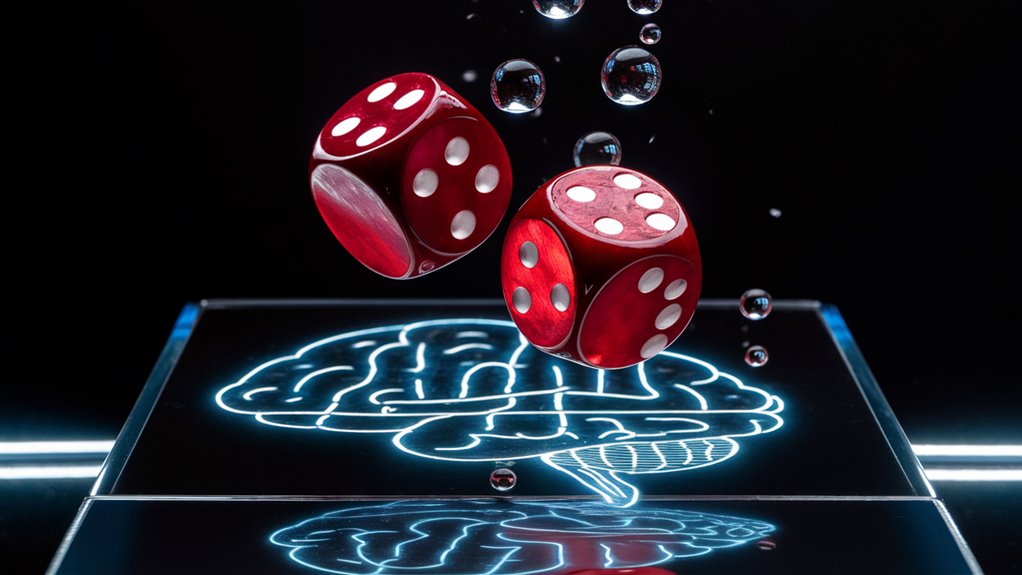
Let’s talk about dopamine, that fascinating brain chemical everyone seems to be buzzing about lately. You might’ve heard people call it the “pleasure chemical,” but there’s actually so much more to it than that.
Think of dopamine as your brain’s multitasking messenger, handling everything from how you move to how you pay attention and make decisions.
You know that feeling when you’re really focused on something interesting? That’s dopamine at work. It’s like your brain’s personal motivational coach, pushing you to take action and chase after your goals.
Whether you’re learning a new skill or tackling your daily to-do list, dopamine helps keep you alert and engaged.
Picture dopamine as your brain’s learning assistant. When you accomplish something, even something small like finishing a crossword puzzle, it helps strengthen those neural pathways that say “hey, this was worth doing.”
But it’s not just about feeling good. This clever little chemical also works as your internal warning system, helping you spot potential risks and rewards in your environment.
What’s really interesting is how dopamine shapes our everyday choices. Remember the last time you felt really driven to complete a project? Or that surge of satisfaction after hitting a personal goal? That was your dopamine system doing its thing.
It’s pretty amazing how one chemical can influence so many aspects of our behavior, from simple daily tasks to more complex decisions about risk and reward.
Of course, understanding these basics helps explain why some activities, like gambling or certain addictive behaviors, can have such a powerful pull on people. It’s all connected to how our brains process rewards and make decisions about what’s worth pursuing.
The Gambling Brain Response
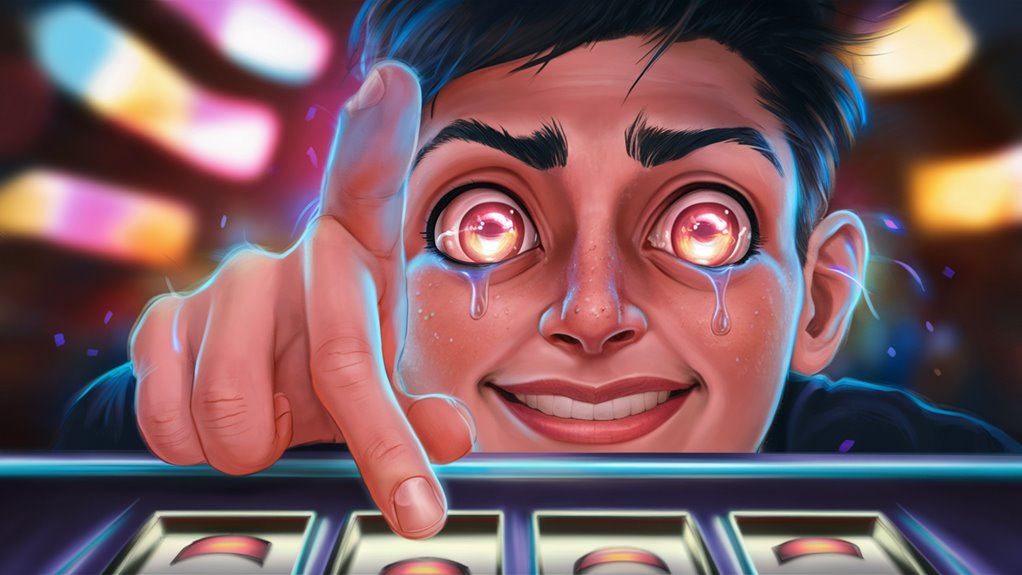
You know how your brain does some pretty interesting things when you’re gambling? Let’s talk about what really happens up there.
Picture this: you’re sitting at a slot machine, and suddenly your brain’s reward system goes into overdrive. It’s not just about winning, though.
That rush of excitement you feel? That’s your brain releasing dopamine, and it happens even before you know if you’ve won or lost.
Here’s something fascinating – your brain isn’t great at telling the difference between real patterns and random chance when you’re caught up in the moment.
Have you ever found yourself thinking, “Red has come up three times, so black must be next” at the roulette table? That’s your brain trying to make sense of pure randomness. It’s pretty common, actually.
What really gets your brain going are those near-misses. You know the feeling, right? When the slot machine shows two jackpot symbols and the third one juuust misses.
Surprisingly, your brain reacts almost as strongly to these close calls as it does to actual wins. It’s like your brain is saying, “We were so close, let’s try again!”
The longer you play, the more sensitive your brain becomes to all this excitement. That’s why you might catch yourself saying, “Just one more spin” or “One last hand.”
Your brain is literally becoming more tuned in to the thrill, making it harder to walk away, even when your wallet is telling you it’s time to call it quits.
It’s not just about the money anymore – your brain is chasing that feel-good rush of dopamine.
Near Misses and Dopamine Surges
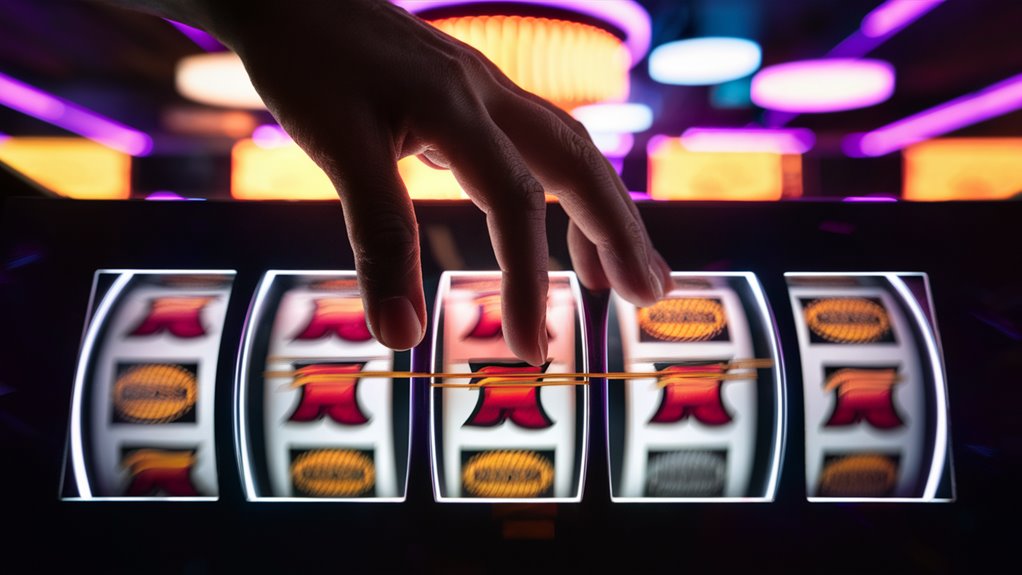
You know how gambling can really mess with your head? Well, let’s talk about those almost-wins that keep you glued to the slot machine. Picture this: you’re watching those symbols line up, two matches appear, and your heart starts racing as the third one spins. Even when it doesn’t quite match up, your brain’s already on a wild ride.
Here’s the fascinating part – your brain actually can’t tell much difference between winning and almost winning. When you get those near misses, your dopamine system lights up almost as intensely as if you’d hit the jackpot.
We’re talking about a reaction that’s up to 80% as powerful as an actual win, which is pretty wild when you think about it.
Your brain’s basically playing tricks on you. It treats these close calls like little learning opportunities, making you feel like you’re getting better at the game or somehow figuring out its patterns.
Your heart beats faster, you lean in closer, and there’s this overwhelming urge to give it just one more try. It’s completely natural – your brain’s reward system kicks into high gear the moment those first two symbols match up.
By the time the third one stops spinning, you’ve already experienced that rush of excitement, creating this powerful hook that makes it super hard to walk away.
Think of it like your brain is that friend who’s always saying “just one more try, you were so close!” The tricky part is, this isn’t just about willpower – it’s your brain’s chemistry working against you, making those near misses feel way more significant than they really are.
Risk Versus Reward Mechanisms
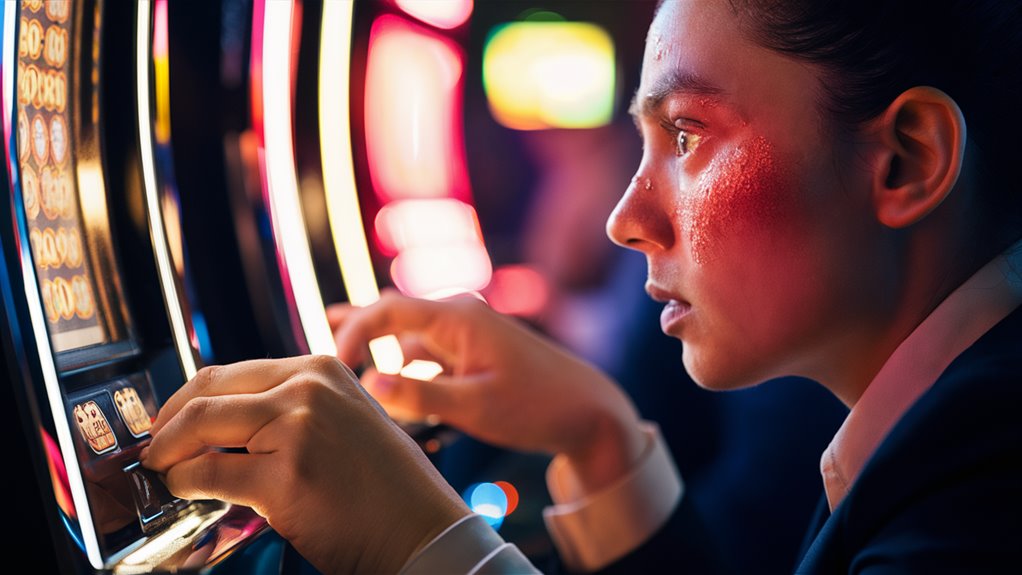
Ever wonder why gambling feels so different from other decisions we make? Well, it’s fascinating how our brains light up in a special way when we’re weighing those betting choices.
Think about that flutter in your stomach when you’re deciding between playing it safe or going for a bigger win – that’s your dopamine system kicking into high gear.
You know how sometimes a $20 win from a scratch card feels more exciting than finding $20 in your old jacket? That’s because your brain, particularly a region called the nucleus accumbens, processes gambling rewards differently from regular ones.
It’s like your brain has a special switch that flips on when there’s uncertain money at stake.
Let’s break down what happens in your head during these moments. Picture yourself at a poker table, trying to decide whether to fold or go all in.
Your brain is actually working overtime, with your prefrontal cortex (think of it as your brain’s decision-making command center) trying to balance that thrilling “what if I win?” feeling against the practical “but I could lose” voice in your head.
The cool part? Your brain releases feel-good chemicals both when you’re making the decision and when you see the outcome, creating this intense cycle that makes gambling especially gripping.
It’s kind of like having an internal rollercoaster that starts climbing the moment you consider placing a bet, peaks when you make your choice, and then whooshes through the results, whether you win or lose.
This biological reaction helps explain why gambling can feel so much more intense than other everyday choices about money.
Chemical Pathways During Gambling
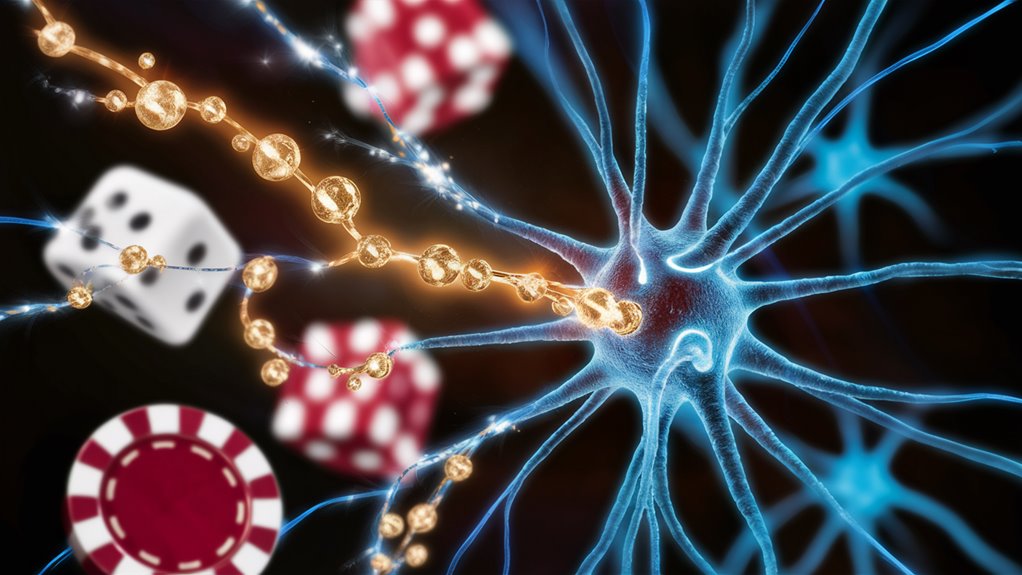
Let’s talk about what happens in your brain when you gamble – it’s actually pretty fascinating stuff.
You know how you get that rush of excitement when placing a bet? That’s your brain’s reward system kicking into high gear, releasing feel-good chemicals like dopamine before you even know if you’ve won.
Here’s something interesting: your brain gets particularly excited during near-misses. You might lose by just a tiny margin, but instead of feeling discouraged, you often feel more motivated to keep playing. That’s because your brain’s chemistry is playing a clever trick on you.
Think of it like a chemical cocktail party in your head. While dopamine brings the excitement, norepinephrine shows up to sharpen your focus, especially when you’re not sure what’s going to happen next.
Serotonin joins the mix too, bouncing up and down like a yo-yo, affecting how you feel and whether you can resist that urge to place another bet.
Have you ever noticed your heart racing during a close call? That’s adrenaline rushing through your body, giving you that unmistakable gambling thrill.
Your brain’s pleasure center, called the nucleus accumbens, is having a field day processing all these exciting signals. Meanwhile, the rational part of your brain, the prefrontal cortex, is trying to keep track of risks and rewards, though it sometimes struggles to keep up with all the excitement.
The whole experience is pretty similar to other enjoyable activities, but there’s a catch. Because gambling is so unpredictable, these chemical reactions can be super intense, which explains why some people find it hard to stop once they start.
It’s like your brain’s reward system on overdrive, making each bet feel more thrilling than the last.
Breaking the Dopamine Loop
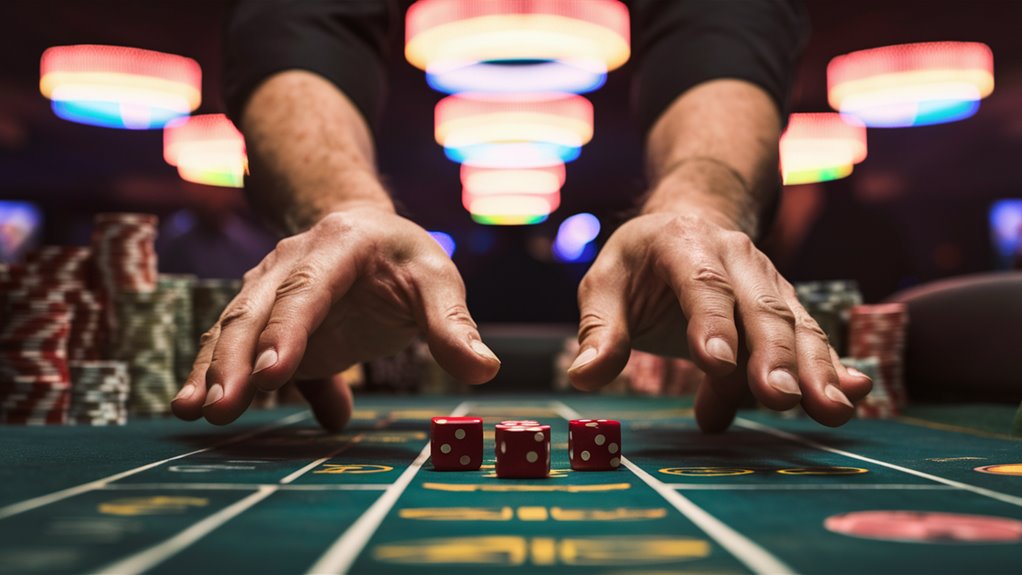
Let’s talk about breaking free from gambling’s dop
Modern Gaming and Neurological Impact
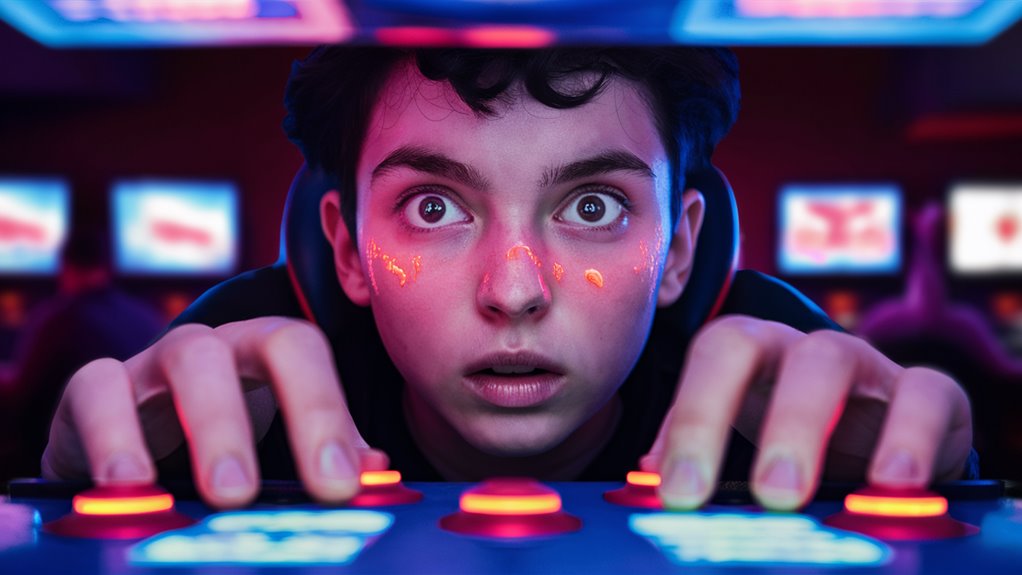
Let’s talk about how modern gaming has completely changed the way our brains react to digital
Common Questions
Can Genetic Factors Predispose Someone to Gambling-Related Dopamine Sensitivity?
Ever wondered why some people seem more drawn to gambling than others? Well, it turns out your genes might have something to do with it. Think of your brain’s reward system like a car’s engine – some people naturally have a more sensitive gas pedal when it comes to feeling pleasure and excitement.
Your DNA basically helps write the instruction manual for how your brain processes dopamine, that feel-good chemical that makes winning feel so amazing. Some folks are born with genetic variations that make their dopamine receptors extra responsive, kind of like having speakers turned up to maximum volume when everyone else is at medium.
This genetic sensitivity can make gambling especially thrilling. You know that rush you get when you’re close to winning? For people with certain genetic variants, that feeling can be much more intense, making it harder to step away from the casino or betting app.
But here’s the interesting part – having these genes doesn’t mean you’re destined to develop a gambling problem. It’s more like having a predisposition, similar to how some people are naturally more likely to sunburn. Just as you’d take extra precautions in the sun, understanding your genetic tendencies can help you make smarter choices about gambling.
Does Dopamine Release Vary Between Different Types of Gambling Activities?
Let’s talk about how different gambling activities affect your brain’s dopamine response. You know how some games get your heart racing more than others? Well, there’s actually some fascinating science behind that.
Think of it like this – slot machines are like drinking an espresso shot, giving you quick, intense bursts of excitement. Every spin creates that “edge of your seat” feeling, and your brain responds with rapid dopamine releases. On the flip side, buying a lottery ticket is more like sipping a slow-brewing tea. The anticipation builds gradually over days or even weeks, leading to a more drawn-out dopamine response.
The faster the game, the quicker your brain pumps out those feel-good chemicals. Poker tournaments, for instance, fall somewhere in the middle. Each hand brings its own little rush, but the overall experience stretches out longer than slots but shorter than lottery games.
Interestingly, your brain reacts differently based on how frequently you get feedback. Games with rapid results, like roulette or blackjack, keep firing those dopamine signals because you’re constantly wondering, “Could this be the winning moment?” It’s this varying pattern of anticipation and reward that makes each type of gambling uniquely engaging to our brains.
How Long Does Gambling-Induced Dopamine Elevation Typically Last After Stopping Play?
Let’s talk about what happens to your brain’s dopamine levels after you step away from gambling. You know how you get that rush of excitement while playing? Well, those elevated dopamine levels typically stick around for about 30 to 60 minutes after you’ve stopped. Think of it like the aftermath of a really intense workout – your body doesn’t just instantly return to its normal state.
Interestingly, if you happen to hit a big win during your gambling session, those feel-good chemicals might hang around quite a bit longer. Your brain can keep riding that euphoric wave for several hours, almost like how you might feel buzzed long after leaving a party where something amazing happened.
It’s worth noting that everyone’s brain chemistry is a bit different, so your personal experience might vary. Some people feel that post-gambling high fade away pretty quickly, while others might find themselves mentally replaying their wins and maintaining that elevated mood for quite a while longer.
Are Certain Age Groups More Susceptible to Gambling’s Dopamine-Triggering Effects?
Let’s talk about how age affects our brain’s response to gambling. You know how some people seem more drawn to the casino than others? Well, there’s actually some fascinating science behind this, especially when it comes to young adults.
If you’re between 18 and 25, you might be particularly susceptible to gambling’s alluring effects. Think of your brain during these years like a sports car with super-sensitive controls. Your reward system is incredibly responsive, lighting up with excitement at the prospect of winning, while the parts of your brain responsible for putting the brakes on risky behavior are still under construction.
The thing is, during young adulthood, your brain releases more dopamine than usual when you’re doing exciting things. It’s kind of like having your volume turned up to maximum. Every win feels absolutely incredible, but this can make it harder to step away from the tables or slots when you should.
What makes this age group particularly interesting is that impulse control is still developing. Picture trying to drive that powerful sports car mentioned earlier before you’ve fully learned how to handle it. The thrill is there, but the ability to properly manage it might not be fully developed yet.
This doesn’t mean everyone in this age group will struggle with gambling, but it does explain why young adults might need to be extra careful when it comes to betting and casino games. Understanding these biological factors can help you make more informed decisions about your gambling habits.
Can Medications Affecting Dopamine Levels Impact Gambling Behavior and Addiction Risk?
Let’s talk about how medications can affect your relationship with gambling. You know how our brain’s reward system works on dopamine? Well, many common medications actually influence these dopamine levels, which can unexpectedly change how we respond to gambling activities.
Think of dopamine like your brain’s pleasure dial. Some medications, particularly antipsychotics and antidepressants, can turn this dial up or down. When these medications adjust your dopamine levels, they might make gambling feel more or less rewarding than usual.
For instance, some Parkinson’s medications that boost dopamine have been linked to increased gambling urges in patients. On the flip side, certain antipsychotics that lower dopamine might reduce the thrill someone gets from gambling. It’s fascinating how a medication prescribed for one condition can have such a significant impact on gambling behavior.
If you’re taking any medications that affect dopamine, it’s worth having a conversation with your healthcare provider about potential gambling-related side effects. They can help monitor your situation and adjust your treatment plan if needed. Remember, everyone’s brain chemistry is unique, so these medications can affect different people in different ways.